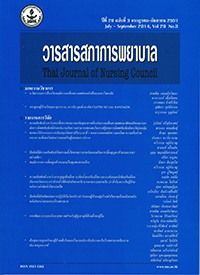การพัฒนาระบบบริการสุขภาพสำหรับผู้สูงอายุที่ต้องพึ่งพาผู้อื่น
Keywords:
รูปแบบการบริการสุขภาพ ผู้สูงอายุ โรคเรื้อรัง ภาวะพึ่งพา, Health service model, Aging, Chronic Illness, Dependent elders.Abstract
บทคัดย่อ:วัตถุประสงค์ของการวิจัย:เพื่อพัฒนารูปแบบบริการสุขภาพในการดูแลผู้สูงอายุที่มีภาวะพึ่งพาโดยการมีส่วนร่วม ระหว่าง ครอบครัว ชุมชน และองค์กรรัฐ
การออกแบบวิจัย: การวิจัยเชิงปฏิบัติการอย่างมีส่วนร่วม (Participatory Action Research)
การดำเนินการวิจัย :กลุ่มตัวอย่างคือ ผู้สูงอายุ ผู้ดูแล เครือข่ายชุมชน และบุคคลากรทีมสุขภาพของศูนย์บริการสาธารณสุขแห่งหนึ่งในกรุงเทพมหานคร การศึกษาแบ่งออกเป็น 2 ระยะคือ
ระยะที่ 1 ประชุมกลุ่ม (Focus Group) ในแต่ละกลุ่มประมาณ 8-10 คน เพื่อหาปัญหาและความต้องการให้การดูแลผู้สูงอายุที่มีภาวะพึ่งพา ระบบสนับสนุนและบริการที่มีอยู่
ระยะที่ 2 ประชุมกลุ่มเพื่อพัฒนารูปแบบของระบบบริการ การวิเคราะห์ข้อมุลใช้การตรวจสอบในกลุ่มระหว่างกลุ่ม จนกระทั่งได้รูปแบบบริการ นำไปทดลองกับผู้สูงอายุที่มีภาวะพึ่งพาใน 3 ชุมชน
ผลการวิจัย: การนำรูปแบบการดูแลผู้สูงอายุที่ต้องพึ่งพาผู้อื่นโดยใช้ชุมชนเป็นฐานโดยมีอาสาสมัครเป็นผู้ประสานความร่วมมือในการดูแลผุ้สูงอายุ ระหว่าง ครอบครัว ชุมชน และศูนย์บริการสาธารณสุขไปทดลองใช้ พบว่าผู้สูงอายุมีความพึงพอใจสูงกว่าก่อนให้บริการอย่างมีนัยสำคัญ ทางสถิติ (p<0.05) ผู้สูงอายุและผู้ดูแลเข้าถึงบริการได้สูงขึ้นกว่าก่อนให้บริการอย่างมีนัยสำคัญทางสถิติ (p<0.05) อย่างไรก็ตามภาวะสุขภาพของผู้สูงอายุและความพึงพอใจในบริการของผู้ดูแลไม่มีความแตกต่างกันอย่างมีนัยสำคัญทางสถิติ
ข้อเสนอแนะ: ระบบริการสุขภาพที่พัฒนาขึ้นนี้มีประโยชน์ในการดูแลผู้สูงอายุในชุมชน และเกิดการแลกเปลี่ยนเรียนรู้จากการร่วมคิด ร่วมทำในกลุ่มที่มีส่วนเกี่ยวข้อง ควรมีการศึกษาประสิทธิผลของรูปแบบบริการนี้ต่อไป
Abstract: Objective: The purpose of study was to develop a health care service model for the dependent elders by the participation of family, community and government organization.
Design: Applied participatory action research (PRA) was used.
Implementation: Purposive sample were the dependent elders, families caregivers, lay persons in the community and health care professionals in the Health Care Centre in Bangkok Metropolitan. In the first phase, a focus group was conducted for each group (8-10 persons) to identify need and problems, support system and health care services available. The second phase another round of focus group was conducted to develop a health care services model. The model has been tested in 3 communities.
Results: The Model Care of the Dependent Elders using Community-Based by Volunteer cooperate care among families, community and health care center was implemented. The findings revealed that dependent elders reported higher satisfaction (p<0.05), dependent elders and caregivers had higher access to the services (p<0.05) than before receiving this service. However, there were no significant differences health status in dependent elders and caregivers’ satisfaction.
Recommendation: The development of health care service model was benefit to care for dependent elders in the community. In addition, the process provided learning by cooperating among stakeholder. The further study needs to explore the effectiveness of the model.








